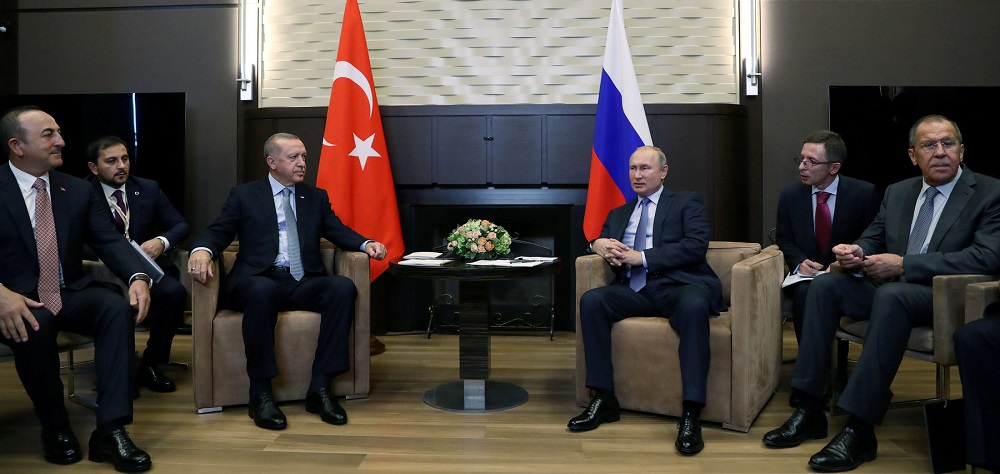Alwaght- Since the March 5 deal between Turkish President Recep Tayyip Erdogan and his Russian counterpart Vladimir Putin on March 5 to stabilize the situation in the Syrian province of Idlib and put an end to the crisis, the terrorist groups backed by Ankara have several times violated the agreement.
Just unlike what many think, the Idlib crisis not only has not ended but also odds are it will deteriorate in the next few days. Three reasons stand for the possible deterioration of the situation in the last major shelter of the foreign-backed terrorist groups.
Erratic and divergent stances of the terrorist groups holding territory in Idlib
The first reason for the possible collapse of the Russian-Turkish agreement is the disunity and lack of unified leadership of the terrorist factions operating in the Syrian city. The city is now the last bastion of a number of terrorist and Salafi groups. In a region of 6,100 square kilometers, the existence of over 100,000 terrorist fighters is quite unordinary. Ahrar Al-Sham, Failaq Al-Sham, Free Idlib Army, Turkmanya Brigades, Elite Army, Nasr Army, and many other militant factions are the terrorist groups holding areas under their control in Idlib. But the Hayat Tahrir Al-Sham, constituted of tens of militia factions, holds a vast portion of Idlib and Syrian-Turkish border areas.
Such a large number of terrorist groups strips them of the potential to gather under the umbrella of unified leadership. Their political system is emir-centered, which means every emir of a region and leader of a faction can issue orders to his loyalists independently.
Although under the deal Turkey promised to rein in the terrorist factions and punish the violators of the deal if needed or even launch military operations against them directly, the realities on the ground indicate that no viable control on these groups can be applied.
Different Turkish-Russian strategic views
Another reason that makes it difficult to think that the Idlib crisis can be solved by the Turkish-Russian negotiations or the agreement of the two countries can sustain is the different ways the Russians and Turks view the crisis in Idlib.
On the one hand, through the deal, Turkey seeks to save the status quo, keep its forces in Idlib, and save its position in the northwestern Syrian equations. In fact, Erdogan eyes the Russian support to the Turkish achievements in Syria under any accord on Idlib.
On the other side, Moscow and Putin want a cessation of the hostilities but insist that any Idlib deal should put an end to the crisis and guarantee the return of the terrorist-held regions under the control of the government of the President Bashar al-Assad.
In the view of the eastern camp, which is comprised of Russia, Iran, and Syria, no future and peace scenario without the central government’s control of the whole Syrian territories is foreseeable. So, the ceasefire or Astana and Sochi initiatives, or the recent Putin-Erdogan agreement only provide a chance to reach a political solution and prevent a humanitarian crisis in the Idlib province. The recent deal is a limited opportunity for Ankara to evacuate the terrorist fighters and their families out of the province.
International support behind Damascus’s anti-terror campaign
Another reason that can lead to the failure of the recent accord is the legitimacy held by Damascus to launch anti-terror operations to reclaim this part of the country from the terrorists’ grip. All international laws advocate the return of Idlib and other areas under Syrian sovereignty. So, President Assad's government’s military campaign in Idlib is legal internationally. Furthermore, the European countries are now fed up with the excessive demands of Erdogan concerning the control of the refugees seeking passage to Europe through Turkey. They, thus, choose not to back Ankara’s Idlib agenda. But Erdogan continues to use the refugee's pressure card against the European governments.
These encourage President Assad to insist on the recapture of Idlib at the present time more than any other time. It appears that Damascus will not agree to any initiative that would not guarantee the exit of terrorists and the return of Idlib to its control. Perhaps the full recapture of Idlib will be postponed for a couple of months, but no outlook for the Syrian war without return of the whole militia-held territories to the central government is predictable. As a conclusion, the Turkish-Russian agreement should be deemed a failed one and doomed to collapse.



























